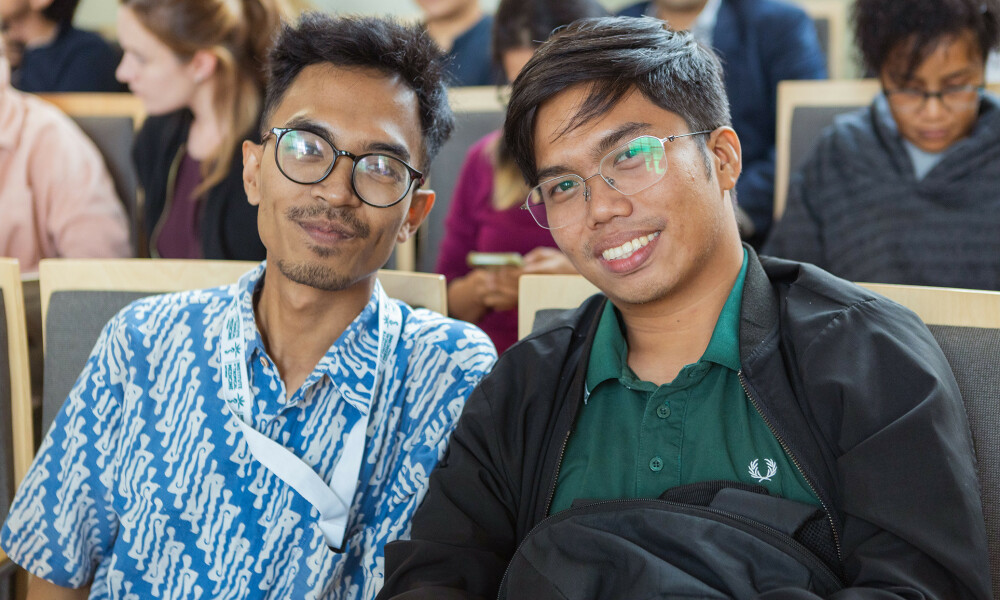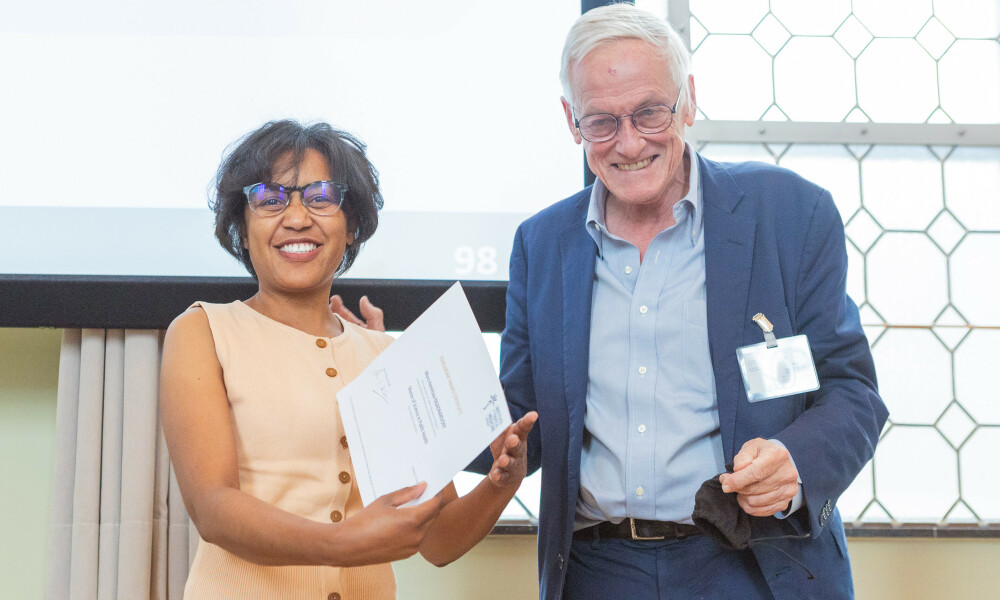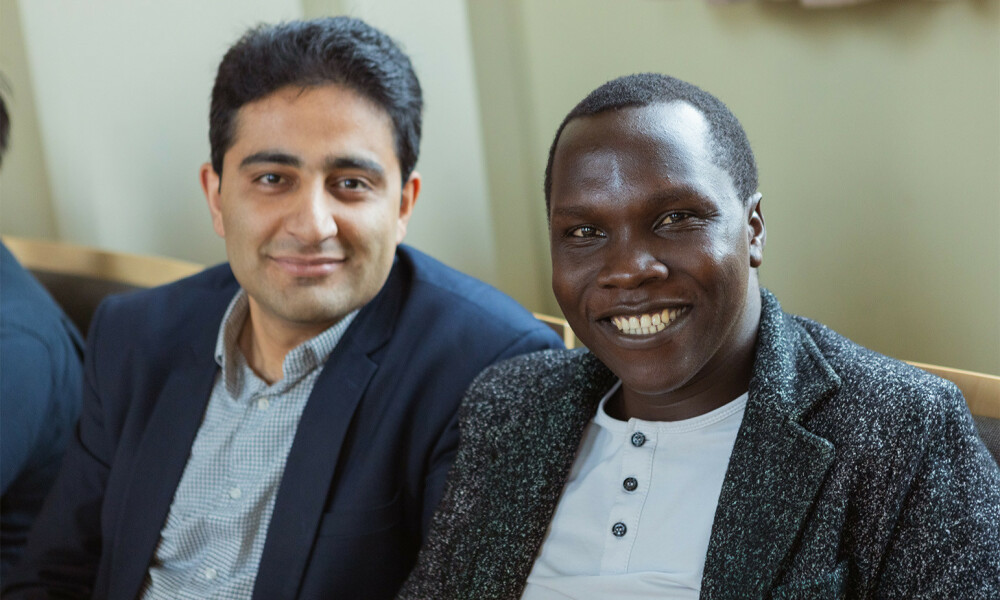
Scholarships to study at ITM
Which scholarship opportunities exist?
DGD scholarships
The Belgian Directorate-General for Development Cooperation (DGD) is the main scholarship sponsor of ITM.
Romain De Cock scholarship
The Romain De Cock scholarship is awarded yearly to a master's student in the field of international health, with a research focus on surgical, obstetrical or gynaecological topics, policies, or clinical questions of interest for surgical practice and public health.
External funding
Alternative scholarship opportunities exist from a variety of sponsors, such as employers, private sponsors, development cooperation projects, and national agencies supporting studies abroad.

DGD scholarships
The Belgian Directorate-General for Development Cooperation (DGD) is the main scholarship sponsor of ITM. Through ITM, DGD offers scholarships for:
Master’s programmes
Short courses, internships and predoctoral traineeships
PhD studies and postdoctoral traineeships
Who can apply?
Citizens from any low or middle-income country (LMIC) can apply. Applicants need to be citizen of a LMIC and actually live there, as defined in the OECD-DAC* list of LMICs. The majority of scholarships, but not all, will be awarded to citizens from the countries defined as priority countries** by the Directorate-General for Development Cooperation (DGD). However, as mentioned above, students from any LMIC can apply.
Candidates with a second citizenship in a high-income country (e.g. through double nationality) and candidates with employment in a high-income country (or who have been employed for more than one year in the three years preceding the application for a scholarship) are not eligible for a DGD scholarship.
* Development Assistance Committee (DAC) of the Organisation for Economic Co-operation and Development (OECD)
** The DGD list of priority countries includes: Benin, Bolivia, Burkina Faso, Burundi, Cambodia, Cameroon, Cuba, Democratic Republic of Congo, Ecuador, Ethiopia, Guinea, Haiti, Indonesia, Kenya, Madagascar, Morocco, Mozambique, Nepal, Niger, Peru, Philippines, Rwanda, Senegal, South Africa, Tanzania, Tunisia, Uganda, Vietnam, Zimbabwe.
What is included?
DGD scholarships can cover travel, tuition (registration and credit fees), insurances and livelihood. A DGD scholarship can be full or partial, covering only one item or a few items (e.g., only tuition fees or only livelihood). In a part-time MSc study track, a DGD scholarship can also cover the costs of course components (modules) outside ITM, in the framework of credit mobility (e.g. in the tropEd network*), or at partner institutions within the framework of a collaborative or joint programme.
* Network for Education in International Health
How are scholarships for courses awarded? What are the selection criteria?
Scholarships can only be awarded to candidates who fulfil all criteria for academic admission to the course. During the online application process, applicants will be able to download a DGD scholarship application form. ITM and DGD will jointly award the available scholarships among the academically highest ranked candidates. DGD scholarships can only be awarded to early- or mid-career candidates, as stated in ITM's scholarship regulations.
Selection criteria are defined by DGD and used to rank applicants. They are:
Personal motivation
Gender (preference for female scholarship candidates in case of equal qualification)
Preferably no previous awarded DGD scholarship in the past (and no study experience in a high-income country)
Preferably employment in a research institute, a higher education institution, the public sector, the social economy, a small or medium-sized enterprise (SME), or a non-governmental organisation
Employment characteristics and prospects, as per support of an employer
Likelihood of professional (re)integration after the course
Employment in a context where the learnings can be applied and developed for a significant period of time
Are doctoral candidates from LMICs eligible for a DGD scholarship?
Each year, three to five PhD scholarships are awarded to ITM alumni and other people with high potential who are admitted to the ITM doctoral (PhD) programme. Applying PhD candidates have to comply to DGD eligibility criteria* before a DGD PhD scholarship can be awarded. A PhD scholarship provides financial support for up to 48 months of doctoral training. These are sandwich scholarships whereby the student can be at ITM for up to 24 months.
* Nationality, home address, home institution, stage in career

Romain De Cock scholarship
The Romain De Cock scholarship is awarded yearly to a master's student in the field of international health, with a research focus on surgical, obstetrical or gynaecological topics, policies, or clinical questions of interest for surgical practice and public health.
Who can apply?
Students from a low- or middle-income country (LMIC) who wishes to enrol in the MSc in Public Health or the MSc in Tropical Medicine. Which master's programme is most relevant, will depend on the applicant’s thesis topic and choice of elective course components. The focus of the thesis research project should have some relation to surgical, obstetrical or gynecological health topics and can include health policies (e.g., access to surgical or reproductive health services) or clinical research topics (e.g., antimicrobial resistance, infection control), of interest for surgical practice. The focus should remain on studying a topic within a broader public health perspective.
We encourage applicants to highlight their interest in this scholarship opportunity in their motivation letter during the application process.
What is included?
The Romain De Cock scholarship is a full scholarship which covers tuition, travel and subsistence.
How is the scholarship awarded? What are the selection criteria?
The scholarship is awarded yearly to a student from a low- or middle-income country (LMIC). The same eligibility rules as DGD scholarships apply (see above).

External funding opportunities
Applicants are strongly encouraged to search alternative scholarship opportunities that exist from a variety of sponsors, such as employers, private sponsors, development cooperation projects, and national agencies supporting studies abroad.
Overview of external scholarship opportunities
Aga Khan Foundation’s International Scholarship
The Aga Khan Foundation’s International Scholarship Programme (ISP) was established by His Highness the Aga Khan. The ISP aims to support gifted, outstanding students from developing countries, who have no other means of financing their studies, to pursue full-time postgraduate studies at reputable higher education institutions of their choice.
Programmes: Master's, PhD
Anonymous Hope Fund®
Through the Anonymous Hope Fund®, we pay special attention on investing in human potential, sustaining health and the environment, improving global economies, and promoting quality education. It provides funding primarily in six areas: Business and Industrial revolution; Agriculture, Food Safety and Security; Humanitarian assistance; Education Development; grooming Civil Society Organizations; and Financial assistance for individuals.
Programmes: Master's, postgraduate, PhD
Dr. Gregory D. Bossart Memorial One Health Scholarship
The Dr. Gregory D. Bossart Memorial One Health Scholarship is available to a graduate student in wildlife biology, epidemiology, veterinary, medical or public health, basic or social sciences, or other programmes focusing on the interconnection between people, animals, plants, and their shared environment, using a One Health framework.
Programmes: Master's, PhD
Educations.com Master's in Europe scholarship
Looking for a master's degree scholarship in Europe? We can help. At educations.com, we believe that students who study abroad become the next generation of globally-minded leaders – and we want more of you to do it!
Programmes: Master's
Erasmus+
Erasmus+ is the EU programme that supports higher education and training in Europe. It provides opportunities to study, train and gain experience within Europe and beyond. ITM has obtained funding to support a limited number of outgoing staff and student mobility initiatives in the academic years 2022-2023 and 2023-2024.
Programmes: Master's
GeneTex Scholarship Program
GeneTex believes in accelerating scientific advancement and the notion that the genesis of future discoveries begins with the support of young scientists now. The GeneTex Scholarship Program will award a $2000 (USD) scholarship to students pursuing a STEM undergraduate or graduate degree. The scholarship will be awarded to one student twice a year.
Programmes: Master's, postgraduate, PhD
GWI International Fellowships
GWI offers every three years, on the occasion of its triennium, a fellowships programme that makes it possible for women graduates to complete exciting research in many important fields. For example, they are exploring new frontiers in medicine, analysing the impact of global trends on women and children and assessing conservation efforts. Many are working in areas directly related to GWI priority interests. Their studies will have far-reaching benefits, for their own careers, and for the communities and countries from which they come.
Programmes: PhD
Harry Frank Guggenheim Emerging Scholar Awards
The Harry Frank Guggenheim Emerging Scholar Awards recognize promising graduate-student researchers in their final year of writing a doctoral dissertation examining a salient aspect of violence.
Programmes: PhD
IvyPanda.com $1,500 Annual Essay Writing Contest Scholarship
IvyPanda.com provides $1500 in scholarships annually for talented students who demonstrate mastery of essay writing. Scholarships will be awarded to two winners: the winner will receive $1,000; the runner-up prize is $500.
Programmes: NA
IvyPanda.com $1,500 Annual Video Contest Scholarship
Each year IvyPanda.com awards creative and talented in movie making students with scholarships $1500 total. Scholarships are given to two winners: the winner receives a $1,000 scholarship; the runner-up prize is $500.
Programmes: NA
J N Tata Endowment
J N Tata Endowment has awarded loan scholarships to more than 5,600 Indian students, drawn from all over India. The Endowment supports only overseas higher studies – Master’s, Ph.D. ,and Post-doctoral fellowships, in any education stream. Based only on Merit, it seeks to reward, “the best and most gifted so as to make them of the greatest service to the country”.
Programmes: Master's, PhD, post-doctoral fellowships
Lasker Essay Contest
The Lasker Essay Contest engages early career scientists and clinicians from the US and around the globe in a discussion about big questions in biology and medicine and the role of biomedical research in our society today. The Contest aims to build skills in communicating important medical and scientific issues to broad audiences.
Programmes: Master's, postgraduate, PhD
Marie Skłodowska-Curie COFUND
The COFUND action provides funding for regional, national and international programmes for training and career development, through co-funding mechanisms. It spreads the MSCA’s best practices by promoting high standards and excellent working conditions. COFUND promotes sustainable training and international, interdisciplinary and inter-sectoral mobility.
Programmes: PhD, post-doctoral
Marie Skłodowska-Curie Postdoctoral Fellowships
The objective of PFs is to support researchers’ careers and foster excellence in research. The Postdoctoral Fellowships action targets researchers holding a PhD who wish to carry out their research activities abroad, acquire new skills and develop their careers. PFs help researchers gain experience in other countries, disciplines and non-academic sectors.
Programmes: post-doctoral
Master Mind Scholarships
The Flemish Ministry of Education and Training awards scholarships for master's programmes in Flanders and Brussels to outstanding students from around the world.
Programmes: Master's
Novus Biologicals Scholarship Program
The Novus Biologicals Scholarship is for students pursuing education in a science related field (Life Science, Medical Science, Health Science). Awarded twice each year in the Fall & Spring semesters. A $1500 (or international currency equivalent) scholarship will be awarded to one student for the fall and spring semesters. Schools/Colleges/Institutes within US, Canada, and European Countries only
Programmes: Master's, postgraduate, PhD
OPEC Fund Scholarship Award/OFIC scholarship
The OPEC Fund Scholarship Award / OFIC scholarship supports outstanding young individuals from developing countries so that they are able to pursue graduate studies in a development-related field.
Programmes: Master's
Rotary Foundation Scholarship
The Rotary Foundation welcomes eligible candidates from all backgrounds. We are looking to invest in early-career candidates for the master’s degree program with at least three years of relevant experience, and mid-career candidates for the certificate program with at least five years of relevant experience.
Programmes: Master's
Silk Roads Youth Research Grant
UNESCO calls on young women and men under the age of 35 to apply for the Silk Roads Youth Research Grant. The grant aims to mobilize young researchers for further study of the Silk Roads shared heritage. Twelve grants of USD10,000 will be awarded per research project.
Programmes: PhD
Studyportals Scholarship International Distinction Awards
The Studyportals Scholarship award will be divided into 2 International Distinction Awards, namely:
A 10,000 EUR big prize award to be offered to one of the two selected applicants
A 5,000 EUR award to be offered to another selected applicant
Selection for the awards will be based on the candidate’s ability to prove his/ her potential of transforming the world into a better place. Therefore, your motivation letter will play a huge role in deterring if you are to be selected.
Programmes: Master's, postgraduate, PhD
The WiSTEM2D Scholars Award Program
The Johnson & Johnson Scholars Award Program aims to fuel development of female STEM2D leaders and feed the STEM2D talent pipeline by awarding and sponsoring women at critical points in their careers, in each of the STEM2D disciplines: Science, Technology, Engineering, Math, Manufacturing and Design.
Programmes: PhD
Wellcome Discovery Awards
The Wellcome Discovery Awards scheme provides funding for established researchers and teams from any discipline who want to pursue bold and creative research ideas to deliver significant shifts in understanding that could improve human life, health and wellbeing.
Programmes: PhD